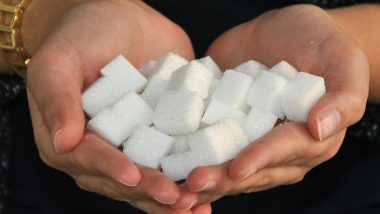Washington, August 7: A low-calorie mixture that is as sweet as table sugar and, in lab experiments, feeds "good" gut microbes has been discovered, according to a recent study. Journal of Agricultural and Food Chemistry is where the study was published.
The popularity of artificial sweeteners has skyrocketed because they enable people to consume sweets without consuming calories. Although they are thought to be safe for consumption by humans, research on both humans and animals suggests that some of them may stimulate appetite, resulting in increased food consumption and weight gain as well as other harmful health effects. Artificial Sweeteners Not Safe, May Up Breast And Obesity Related Cancer Risk, Says Study.
As a result, scientists have been looking into low-calorie or extraordinarily sweet substances derived from natural sources as potential replacements. Galactooligosaccharides, for instance, are low-calorie sugars with a prebiotic activity that can serve as a source of energy for advantageous gut microbes, but they aren't quite sweet enough to replace table sugar. They are found in mammalian milk.
As an alternative, mogrosides, which are 200-300 times sweeter than table sugar, are found in extracts from the Luo Han Guo fruit. However, these extracts occasionally have unpleasant flavours that enzymes can eliminate. F. Javier Moreno and colleagues used enzymes to modify mogrosides while simultaneously producing galactooligosaccharides for a novel low-calorie sweetener in order to benefit from the best features of both natural substances.
Starting with lactose and mogroside V, the researchers (the primary mogroside in Luo Han Guo fruit). The researchers' mixture contained primarily galactooligosaccharides and a small number of modified mogrosides before they added b-galactosidase enzymes. The new combination was described by a trained sensory panel as having a sweetness resembling sucrose (table sugar), suggesting that consumers might find it tolerable.
The new combination was described by a trained sensory panel as having a sweetness resembling sucrose (table sugar), suggesting that consumers might find it tolerable. The new sweetener increased levels of several advantageous human gut microbes, including the bacterial species Bifidobacterium and Lactobacillus, in test tube studies. Additionally, the mixture might have a prebiotic effect on the gut microbiome based on increases in bacteria-produced metabolites like acetate, propionate, and butyrate. The new sweetener appears promising, according to the researchers, and their next step will be to more thoroughly examine the substance's effects on gut health in people.
(This is an unedited and auto-generated story from Syndicated News feed, LatestLY Staff may not have modified or edited the content body)













 Quickly
Quickly




















